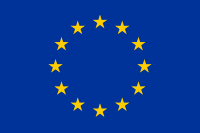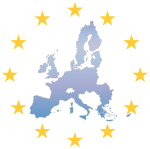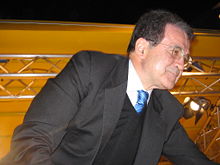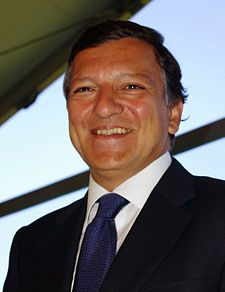President of the European Commission
| President of the European Commission |
|
 Commission emblem |
|
| Appointer | European Council, approved by the European Parliament |
|---|---|
| Term length | 5 years, renewable once |
| Inaugural holder | Walter Hallstein |
| Formation | 1958 |
| Website | ec.europa.eu/president |
The President of the European Commission is the head of the European Commission, the executive branch of the European Union. The post was established in 1957 and is appointed by the European Council and European Parliament for five year terms.
The role of President is to give political direction to the Commission and represent it externally. He leads a college of 26 other European Commissioners, one from each European Union member state (less the President's state), who the President assigns a portfolio.
The current President is José Manuel Barroso, who took office towards the end of 2004. He is a member of the European People's Party and is the former Prime Minister of Portugal.
Contents |
History
| European Union |
 This article is part of the series: |
|
|
| Treaties |
|---|
| Rome · Maastricht (Pillars) Amsterdam · Nice · Lisbon |
| Institutions |
| Commission
President José Manuel Barroso |
| Parliament
President Hans-Gert Pöttering |
| Council
Presidency: France (Nicolas Sarkozy) |
| Other & Future Institutions
Court of Justice · Court of Auditors |
| Elections |
| Last election (2004) · 2007 by-election Next election (2009) · Constituencies Parties · Foundations · Parliamentary groups |
| Related topics |
| States · Enlargement · Foreign relations Law · EMU · Other bodies · Agencies |
|
Other countries · Atlas |
- Further information: European Commission#History and History of the European Union
The President of the European Commission was established in 1957 with the European Commission. Previously it was merely a post of first among equals but had an increasing impact on the Community. Under Jacques Delors it became increasingly presidential in style and now is the dominant force in the Commission, although curbed by crises such as the resignation of the Santer Commission.
Establishment
Before the establishment of the present European Commission, there was the High Authority of the European Coal and Steel Community. In 1957 the present Commission was established by the Treaty of Rome, and it also replaced the High Authority and the Commission of Euratom in 1967.[1] The Commission's first president was Walter Hallstein (see Hallstein Commission) who's started consolidating European law and began to impact on national legislation. National governments took little heed of his administration at first with the President having to stamp the Commission's authority early on. With the aid of the European Court of Justice the Commission began to be taken more seriously.[2]
In 1965 Hallstein put forward his proposals for the Common Agricultural Policy, which would give the Community its own financial resources while giving more power to the Commission and Parliament and removing the veto power over Agriculture in the Council. These proposals led to an immediate backlash from France.[3] Hallstein knew the proposals would be contentious, and took personal charge of drafting them, overriding the Agriculture Commissioner. However he did gain the support of Parliament though his proposals to increase its powers, and he also presented his policy to Parliament a week before he submitted them to the Council. He aimed to demonstrate how he though the Community ought to be run, in the hopes of generating a wave of pro-Europeanism big enough to get past the objections of member states. However in this it proved that, despite its past successes, Hallstein was overconfident in his risky proposals.[4]
In reaction to Hallstein's proposals and actions, then-French President, Charles de Gaulle, who was sceptical of the rising supranational power of the Commission, accused Hallstein of acting as if he were a head of state. France eventually withdrew its representative from the Council, triggering the notorious "empty chair crisis".[3] Although this was resolved under the "Luxembourg compromise", Hallstein became the scapegoat for the crisis. The Council refused to renew his term, despite being the most 'dynamic' leader until Jacques Delors.[4]
1967-85
Hallstein's work did enable the Commission to be a real player. During the 1970s the Presidents were involved in the major political projects of the day, such as the European Monetary Union.[5] In 1970, President Jean Rey secured the Community's own financial resources[6] and in 1977, President Roy Jenkins became the first Commission President to attend a G7 summit on behalf of the Community.[7]
However due to problems such as the 1973 oil crisis and the 1979 energy crisis, economic hardship but the European ideal on the back burner, with only the President trying to keep the idea alive. However the member states had the upper hand and they created the European Council to discuss topical problems. However the Council was unable to keep the major projects on track such as the Common Agricultural Policy.[8] The Community entered a period of eurosclerosis due to economic difficulties and disagreements on the Community budget, and by the Thorn Commission the President was unable to exert his influence to any significant extent.[9]
Presidentialism

However the Commission began to recover under President Jacques Delors' Commission. He is seen as the most successful President, being credited with giving the Community a sense of direction and dynamism.[10] The International Herald Tribune noted the work of Delors at the end of his second term in 1992: "Mr. Delors rescued the European Community from the doldrums. He arrived when Europessimism was at its worst. Although he was a little-known former French finance minister, he breathed life and hope into the EC and into the dispirited Brussels Commission. In his first term, from 1985 to 1988, he rallied Europe to the call of the single market, and when appointed to a second term he began urging Europeans toward the far more ambitious goals of economic, monetary and political union."[11]
But Delors not only turned the Community around, he signalled a change in the Presidency. Before he came to power the Commission President still a position of first among equals, when he left office he was the undisputed icon and leader of the Community. His tenure had produced a strong Presidency and a strong Commission as the President became more important. Following treaties cemented this change, with the President being given control over the allocation of portfolios and being able to force the resignation of Commissioners. When President Romano Prodi took office with the new powers of the Treaty of Amsterdam, he was dubbed by the press as Europe's first Prime Minister.[12][13] However, President Delors' work had increased the powers of Parliament, whose support he had enjoyed. Later Commissions did not enjoy the same support, which became most notable when the Santer Commission was forced to resign in 1999.[14]
Appointment

The President is first nominated by the European Council; that nominee is then officially elected by the European Parliament. The candidate selected by the Council has often been a leading national politician but this is not a requirement. In 2004, the proposed European Constitution had included a provision that the choice of President must take into account the latest Parliamentary elections. That provision was not in force in the nomination in 2004, but the centre-right parties of the EU pressured for a candidate from their own ranks. In the end, a right-wing candidate was chosen: José Manuel Barroso of the European People's Party.[15]
There are further criteria influencing the choice of the Council, these include: which area of Europe the candidate comes from, favoured as Southern Europe in 2004; the candidate's political influence, credible yet not overpowering members; language, proficiency in French considered necessary by France; and degree of integration, their state being a member of both the eurozone and the Schengen Agreement.[16][17][18]
In 2004, this system produced a number of candidates[19] and was thus criticised by some MEPs: following the drawn-out selection, the ALDE group leader Graham Watson described the procedure as a "Justus Lipsius carpet market" producing only the "lowest common denominator"; while Green-EFA co-leader Daniel Cohn-Bendit asked Barroso after his first speech "If you are the best candidate, why were you not the first?"[20][21]
Elections
- Further information: Elections in the European Union
In February 2008, President Barroso admitted there was a problem in legitimacy and that, despite having the same legitimacy as Prime Ministers in theory, in practice it was not the case. The low voter turnout creates a problem for the President's legitimacy, with the lack of a "European political sphere", but analysis claim that if citizens were voting for a list of candidates for the post of President, turn out would be much higher than that seen in recent years.[22]
Under the European Constitution the European Council would have to take into account the results of the latest European elections and, furthermore, the Parliament would elect, rather than simply approve, the Council's proposed candidate. This was taken as the parliament's cue to have its parties run with candidates for the President of the Commission with the candidate of the winning party being proposed by the Council.[23] This was partly put into practice in 2004 when the European Council selected a candidate from the political party which won that year's election. However at that time only one party had run with a specific candidate: the European Green Party, who had the first true pan-European political party with a common campaign,[24] put forward Daniel Cohn-Bendit.[23] However the fractious nature of the other political parties led to no other candidates, the People's Party only mentioned four or five people they'd like to be President.[25]
The Constitution failed ratification but these amendments have been carried over to the Treaty of Lisbon which is planned to come into force in 2009. There are plans to strengthen the European political parties[26] in order for them to propose candidates for the 2009 election.[27][28] The European Liberal Democrat and Reform Party have already indicated, in their October 2007 congress, their intention for forward a candidate for the post as part of a common campaign.[29]
Term of office
The President is elected for a renewable five year term starting six months after the elections to the European Parliament. These were brought into alignment via the Maastricht Treaty and the elections take place in June every five years (the first election was held in 1979, hence all subsequent elections are held on years ending in 4 and 9).[30] This alignment has led to a closer relationship between the elections and the President himself with the above mentioned proposals for political parties running with candidates.
The President and his Commission may be removed from office by a vote of censure from Parliament. Parliament has never done this to date, however the threat of this happening in 1999 due to allegations of financial mismanagement led to the Santer Commission resigning on its own accord, before the Parliament forced them out.[31]
In the Treaty of Lisbon, the European Council can end the President's term of office in the event of an impediment or serious misconduct (article 9B (5)).
Duties and powers

The role of the President is lead the Commission, and give direction to the Commission and the Union as a whole. The treaties state that "the Commission shall work under the political guidance of its President" (Article 219 TEC), this is conducted through his calling and chairing of meetings of the college of Commissioners. The Commissioners are assigned their portfolios (and the role of Vice President of the European Commission) of responsibilities by the President, who may subsequently remove them or force them to resign.[30] The power of the Commission as a whole is to propose and enforce the law of the European Union, in addition to representing it abroad.[32]
The work of the Commission as a body is based on the principle of Cabinet collective responsibility, however in his powers he acts as more than a first among equals.[30] The Presidents office is on the top, 13th, floor of the Berlaymont building in Brussels. The president receives his political guidance from his cabinet, the head of which acts as a political bodyguard for the President. Such factors can lead to an isolation of the President from outside events.[33] For the European Civil Service he has a status akin to a deity, due to his immense authority and symbolism within the body.[34] The President exercises further authority through the legal service and Secretariat-General of the Commission. The former has the power to strike down proposals on legal technicalities while the latter organises meetings, agendas and minutes. His control over these areas gives the President further political tools when directing the work of the Commission. This has also increased the Presidential style of the Commission President.[35]
The Presidential system had started to develop since Jacques Delors and has since been cemented, a strong President with competent mandarins is practically unstoppable. However, externally he is still dependent on support from the Council and Parliament. Delors had enjoyed the Parliament's and the Council's support for his whole term, and due to his work the Parliament increased in powers and the Council increased in membership. The membership is now so large the President is increasingly unable to garner the support of all the states, even though the job is supposed to try to keep everyone happy. The Parliament now has more powers over the Commission and can reject its proposals, although the Commission has little power over Parliament, such as the ability to dissolve it to call new elections.[36]
The President also has responsibility for representing the Commission in the Union and beyond. For example, he is a member of the European Council and takes part in debates in Parliament and the Council of Ministers. Outside the Union he attends the meetings of the G8 to represent the Union.[30] However in foreign affairs, he does have to compete several Commissioners with foreign affairs related portfolios, the High Representative for the Common Foreign and Security Policy and the President of the European Council.[37]
Competition
Despite the recent Presidential style, the President has also begun to lose ground to the larger member states as countries such as France, Italy, the UK and Germany seek to sideline its role. This may increase with the creation of the permanent President of the European Council.[38] Although there are concerns that competition with the new Council President would lead to increased infighting,[39] there are provisions for combining the two offices. The Council President may not hold a national office, such as a Prime Minister of a member state, but there is no such restraint on European offices. So the Commission President, who already sits in the European Council, could also be appointed Council President. This would allow the Council to combine the position, with its powers, of both executive bodies into a single President of the European Union.[40]
Privileges of office
The President's salary is (as of 2004) 266,530 euro. This is compared to a normal Commissioner who is paid 217,280 euro.[41] The President is awarded no official residence or private jet, but does receive a housing allowance, chauffeured car and a personal staff of approximately 20 people.[42]
List of Presidents
Legend: [ ] left leaning (e.g. PES) - [ ] liberal (e.g. ELDR) - [ ] right leaning (e.g. CD/EPP)
| President | Took office | Left office | State | Party | Photo | |
|---|---|---|---|---|---|---|
| 1 | Walter Hallstein Hallstein Commission |
1958-01-01 | 1967-06-30 | Christian Democrats National: CDU |
||
| 2 | Jean Rey Rey Commission |
1967-07-02 | 1970-07-01 | Liberal Democrat National: PRL |
||
| 3 | Franco Maria Malfatti Malfatti Commission |
1970-07-02 | 1972-03-21 | Christian Democrats National: DC |
||
| 4 | Sicco Mansholt Mansholt Commission |
1972-03-22 | 1973-01-05 | Socialists National: PvdA |
||
| 5 | François-Xavier Ortoli Ortoli Commission |
1973-01-06 | 1977-01-05 | Christian Democrats National: RPR |
||
| 6 | Roy Jenkins Jenkins Commission |
1977-01-06 | 1981-01-19 | Socialists National: Labour |
||
| 7 | Gaston Thorn Thorn Commission |
1981-01-20 | 1985-01-06 | Liberal Democrat National: Demokratesch |
||
| 8 | Jacques Delors Delors Commission |
1985-01-07 | 1995-01-24 | Socialists National: PS |
 |
|
| 9 | Jacques Santer Santer Commission |
1995-01-25 | 1999-03-15[43] | People's Party National: CSV |
||
| ~ | Manuel Marín Interim Marín Commission |
1999-03-15 | 1999-09-17 | Socialists National: PSOE |
||
| 10 | Romano Prodi Prodi Commission |
1999-09-17 | 2004-11-22[44] | Liberal Democrat National: Democratici |
 |
|
| 11 | José Manuel Barroso Barroso Commission |
2004-11-22 | incumbent Term expires 2009-10-31 |
People's Party National: PSD |
 |
See also
- Vice-President of the European Commission
- European Commissioner
- List of presidents of EU institutions
- President of the European Parliament
- President of the European Council
- Presidency of the Council of the European Union
References
- Eppink, Derk-Jan; Ian Connerty (translator) (2007). Life of a European Mandarin: Inside the Commission (1st edition ed.). Tielt, Belgium: Lannoo. ISBN 978-9020970227.
- ↑ "European Commission". European NAvigator. Retrieved on 2007-06-18.
- ↑ Eppink, 2007, p.221-2
- ↑ 3.0 3.1 "The 'empty chair' policy". European NAvigator. Retrieved on 2007-09-24.
- ↑ 4.0 4.1 Ludlow, N (2006). "De-commissioning the Empty Chair Crisis : the Community institutions and the crisis of 1965-6" (PDF). London School of Economics. Retrieved on 2007-09-24.
- ↑ Eppink, 2007, p.222
- ↑ "The Rey Commission". Europa (web portal). Retrieved on 2008-02-10.
- ↑ "EU and the G8". European Commission. Retrieved on 2007-09-25.
- ↑ Eppink, 2007, p.222-3
- ↑ Eppink, 2007, p.24
- ↑ "The new Commission - some initial thoughts". Burson-Marsteller (2004). Retrieved on 2007-06-17.
- ↑ Merritt, Giles (1992-01-21). "A Bit More Delors Could Revamp the Commission". International Herald Tribune. Retrieved on 2007-10-17.
- ↑ James, Barry (1999-04-16). "Prodi to Have Wide, New Powers as Head of the European Commission". International Herald Tribune. Retrieved on 2007-06-17.
- ↑ Rossant, John (1999-09-27). "Commentary: Romano Prodi: Europe's First Prime Minister? (int'l edition)". Business Week. Retrieved on 2007-06-17.
- ↑ Eppink, 2007, p.228
- ↑ "Choosing a New EU Commission President". Deutsche Welle] (2004-06-16). Retrieved on 2007-08-27.
- ↑ Fuller, Thimas (2004-06-30). "Portuguese premier wants to unite bloc : Barroso nominated to head EU executive". International Herald Tribune. Retrieved on 2007-07-01.
- ↑ Stuart, Paul (2004-07-21). "Portugal’s Prime Minister Barroso nominated as European Commission president". World Socialist Web Site. Retrieved on 2007-07-01.
- ↑ "José Manuel Durão Barroso: The New Commission President". Grayling (2004). Retrieved on 2007-07-01.
- ↑ "Commission president: Key candidates". BBC News (2004-06-27). Retrieved on 2007-07-01.
- ↑ Cohn-Bendit, Daniel (2004). "Nomination of Commission President handled "in a most unsatisfactory way"". European Parliament. Retrieved on 2007-07-01.
- ↑ Watson, Graham (2004-07-21). "Statement by the President-designate of the Commission". Graham Watson MEP website. Retrieved on 2007-07-01.
- ↑ Mahony, Honor (2008-02-28). "Barroso admits legitimacy problem for commission president post". EU Observer. Retrieved on 2008-02-29.
- ↑ 23.0 23.1 Hughes, Kirsty. "Nearing Compromise as Convention goes into Final Week?" (PDF). EPIN. Retrieved on 2008-01-30.
- ↑ "European Greens Found European Greens". Deutsche Welle (2004-02-23). Retrieved on 2008-01-30.
- ↑ "The EP elections: Deepening the democratic deficit". Euractiv (2004-06-16). Retrieved on 2007-07-27.
- ↑ Mahony, Honor (2007-06-27). "European politics to get more political". EU Observer. Retrieved on 2007-06-28.
- ↑ Palmer, John (2007-01-10). "Size shouldn't matter". The Guardian. Retrieved on 2007-06-28.
- ↑ "Leadership of the EU". Federal Union. Retrieved on 2007-08-27.
- ↑ "RESOLUTION ELDR CONGRESS IN BERLIN 18-19 OCTOBER 2007". ELDR party (2007-10-24). Retrieved on 2008-01-04.
- ↑ 30.0 30.1 30.2 30.3 "Role and Powers". Europa (web portal). Retrieved on 2008-01-10.
- ↑ Harding, Gareth (1999-03-18). "Unfolding drama of the Commission's demise". European Voice. Retrieved on 2007-10-07.
- ↑ "Institutions of the EU: The European Commission". Europa (web portal). Retrieved on 2007-06-18.
- ↑ Eppink, 2007, p.211-3
- ↑ Eppink, 2007, p.211
- ↑ Eppink, 2007, p.217-21
- ↑ Eppink, 2007, p.226-8
- ↑ Eppink, 2007, p.232-3
- ↑ Iey Berry, Peter Sain (2008-01-18). "[Comment Power is slipping from the commission to the council]". EU Observer. Retrieved on 2008-01-18.
- ↑ Hix, Simon. "Why the Franco-German Plan would institutionalise 'cohabitation' for Europe". Foreign Policy Centre. Retrieved on 2007-10-01.
- ↑ "SCADPlus: The Institutions of the Union: European Council". Europa (web portal). Retrieved on 2007-06-27.
- ↑ "What does an EU commissioner do?". BBC News (2004-11-18). Retrieved on 2008-01-10.
- ↑ Mahony, Honor (2008-04-14). "Member states consider perks and staff for new EU president". EU Observer. Retrieved on 2008-04-15.
- ↑ Resigned early. Commission served in caretaker capacity under Marín till September. Replaced by Prodi who competed Santer's mandate to 22 January 2000 when they were reappointed on their own mandate.
- ↑ Term lasted till 31/10/04, continued as caretaker till 22/11/04 due to delay in appointment of Barroso Commission.
External links
- Commission President (official website)
- Terms of office
- Organisation of the European Commission European NAvigator
|
||||||||
|
|||||
|
|||||
